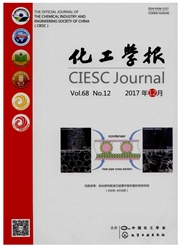

 中文摘要:
中文摘要:
在连续流超临界水反应器中,以Ni/ZrO2为催化剂,以聚乙二醇(polyethylene glycol,PEG)水溶液作为研究对象,考察了近一超临界状态下的有机质气化产氢特性。实验结果显示,PEG的气化产物主要成分为H2、CO、CH4和CO2;其中,当加入90g15%Ni/ZrO2时,在430℃、压力24MPa、停留时间300S的条件下,可以生成70.14mmol H2·(gPEG)^-1为不加入催化剂时的5.1倍,为加入90gZrO2时的2.6倍,相应的TOC去除率、碳气化率和氢气化率分别达到88.84%、88.50%和169.40%;增大活性组分Ni的质量分数可以提高气化效果,在410℃、压力24MPa、停留时间180s的条件下,Ni质量分数从5%提高到15%时,TOC去除率、碳气化率和氢气化率分别从45.31%、44.55%和78.25%提高到58.66%、58.16%和112.49%;反应温度的上升和停留时间的延长对气化效果有正影响,明显提高H2的摩尔产率;PEG浓度的上升可抑制水气转换反应并促进甲烷化反应的进行而导致其气化效率下降,其中,H2产量急剧下降,CO2产量先上升后下降,而CH4产量随PEG浓度上升而上升。研究结果证明了所研制的Ni/ZrO2催化剂在近一超临界水中对PEG的催化气化特别是产H2表现出高活性,在达到相同反应效率前提条件下使反应温度降低约80℃。
 英文摘要:
英文摘要:
The polyethylene glycol (PEG) solution was examined in the presence of zirconium oxide supported nickel catalysts (Ni/ZrO2) in sub- and supercritical water (350--430℃ and 24 MPa) in a continuous reactor with the residence time of 60--300 s. As a result, the main gaseous products were hydrogen, carbon monoxide, methane and carbon dioxide. When PEG was gasified with 90 g 15% Ni/ZrO2 at 430℃, 24 MPa, residence time 300 s, 70.14 mol H2 was produced by gasifying 1 kg PEG, which was 5.1 times of the hydrogen yield produced without catalyst, 2.6 times of the hydrogen yield produced catalyzed with 90 g ZrO2, the RToc (TOC removal efficiency), Rcc (carbon gasification ratio) and RHG (hydrogen gasification ratio) were 88.84%, 88.50% and 169.40% respectively. The amount of gases increased with an increase in nickel loading on zirconium oxide. When the mass fraction of Ni rose to 15% from 5%, the RTOC, Rcc; and RHG; rose to 58. 66%, 58. 16% and 112.49%from 45.31%, 44.55% and 78. 25% respectively at 410℃, 24 MPa, residence time 180 s. Higher temperature and longer residence time had positive effect on gasification and increase hydrogen yield. The gasification efficiency and H2 yield decreased with the increase of PEG concentration, but CO2 yield increased initially and then decreased and CH4 yield increased because the water-gas shift reaction was restrained and the methanation reaction was accelerated with the increase of PEG concentration. The experiment proved that Ni/ZrO2 showed good catalytic activity, especially in hydrogen production. For the same reaction efficiency, reaction temperature can be lowered by about 80℃.
 同期刊论文项目
同期刊论文项目
 同项目期刊论文
同项目期刊论文
 期刊信息
期刊信息
